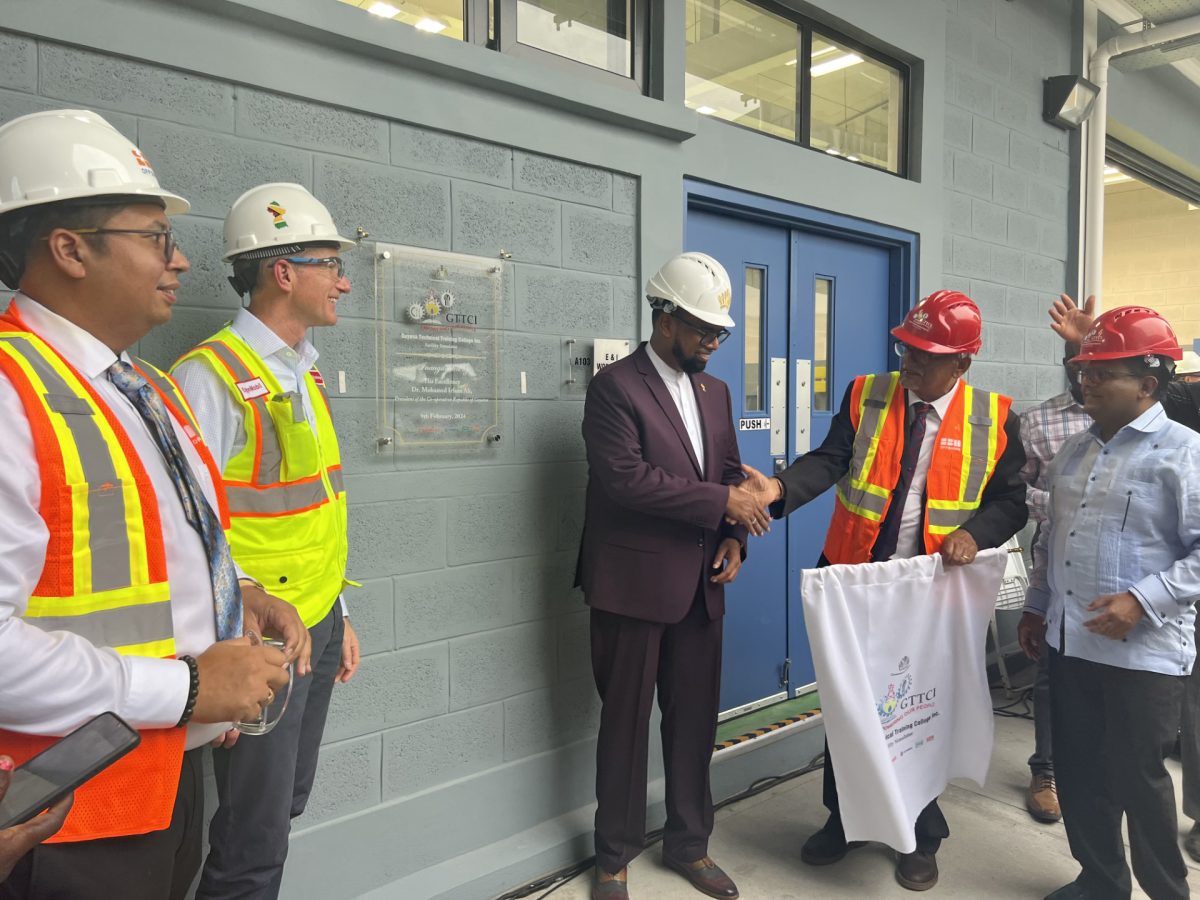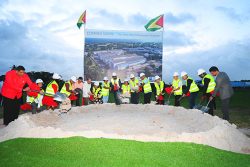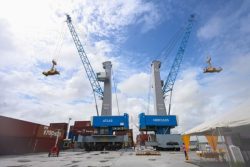As part of the first phase of the Guyana Technical Training College Inc (GTTCI) at Port Mourant, Corentyne, President Irfaan Ali yesterday commissioned a Facility Simulator to the tune of US$13m which will train workers for the offshore oil platforms.
The simulator better known as FacTor is a state-of-the-art training facility that is the first phase to be completed as part of the wider GTTCI, an alliance between the Government of Guyana and the Stabroek Block co-venturers, ExxonMobil Guyana Limited (EMGL), Hess and CNOOC.
The FacTor training site consists of classrooms, workshops and the FacTor module. The project is funded by the Stabroek block co-venturers to the tune of approximately US$13M ($2.6B) and was planned and developed by EMGL in close collaboration with SBM Offshore who oversaw the design and construction of the FacTor unit.
The facility is designed to provide practical training for multiple program-mes, enabling trainees to execute practice operations, troubleshooting, and maintenance activities in an environment that mirrors real-life plant conditions.
The facility is considered safe for training because it is designed to use mediums such as water and air, and there are no potentially hazardous gases or liquids used. The plant comprises several major pieces of equipment to simulate the process conditions on a Floating Production, Storage and Offloading (FPSO) platform in a safe and controlled environment.
FacTor can accommodate up to 24 trainees for each batch, with four
trainers across four disciplines – Mechanical, Instrumentation, Electrical, and Production. The facility is designed to recognize industrial standards used in the oil, gas, and energy industry worldwide and is expected to have a positive impact on the local oil and gas sector by providing trained technicians who will have the relevant competencies and skills to execute their roles offshore.
Ali speaking at the commissioning yesterday in Port Mourant, said that the GTTCI was conceptualized just two years ago and is a part of the government’s programme to provide skills training aimed at preparing students for employment in three sectors.
He said, “Our new technically sophisticated, offshore and rapidly growing oil and gas industry, through the Oil and Gas Institute, two; the hospitality and tourism industry via the Hospitality and Tourism Institute and three; manufacturing, construction and other technical service based industries, including welding, fabrication.”
Ali pointed out, that the training facility is equipped with the FacTor process equipment explaining “it was designed and engineered in Singapore, previously to serve major oil and gas companies in Southeast Asia before being shipped here in 2022.”
“The equipment will enable our Guyanese students to undergo training using hands on experiential methodologies in mechanical, electrical, instrument and process operations of the FPSO source operating in out Atlantic waters. A six-month training period and FacTor coupled with the preparatory 12-month fundamental training will equip our graduates with theoretical, laboratory, workshop, experimental and skill sets needed to be ready for jobs on the FPSOs.”
After fully being constructed the GTTCI will be designed to facilitate oil and gas training (Track 1) funded by ExxonMobil, Hospitality and Tourism Institute (Track 2) funded by the government with the Caribbean Development Bank and the Port Mourant Training College (Track 3) which falls under GuySuCo and the Ministry of Agriculture.
Residency facility
According to Ali, the GTTCI which is being built by Raffik and Sons Construction will also have a 150-student residency facility, administrative offices, “and we hope to complete the phase two before the end of 2025.”
Noting that the Facility Simulator was built to the tune of US$13m, Ali said, “This of course is part of our holistic training, infrastructure and ecosystem that we are building for our young people across the country”.
Director of the GTTCI Professor Clement K Sankat, yesterday said that he was proud to be a part of the project noting that the Facility Simulator was built, equipped and commissioned within eight months.
“This is meant to provide the experiential fields of the specialized training that our students are going to have, six months, and prepare them as technicians for the FPSOs that are working in the Atlantic waters, overseas and where our oil and gas comes from.”
Sankat, a Guyanese, added, “All of us are who have worked on this project diligently in this part of Berbice, it is not often we build things within time and within budget but this was a crack team that dealt with this effort and I will salute them as we go forward.”
“It demonstrates to our country that we can accomplish great things in our humble country if we plan very well and we put our hearts and souls to getting it done. We are a part of significant technological and infrastructural transformation in our country, led by our President and his team, and it is therefore incumbent and I’m appealing to the parents here who are gathered and the teachers that we must prepare our young citizens, our young students to be trained, to be engaged and so benefit from all that this oil and gas and the other industries will bring to this country, our new economy.”
Additionally, Sankat, former Principal of the University of the West Indies, St Augustine Campus pointed out that the GTTCI will also bring development and immense benefits in time to the community of Port Mourant and nearby villages.
Meanwhile, Martin Cheong, General Manager, SBM Offshore, at the commissioning yesterday said that it was an exciting new chapter in the development of Guyana’s oil and gas sector. “This state-of-the-art training facility marks not just an achievement for SBM … but a significant milestone for the industry and the nation.”
“This collaboration is a testament of our shared values and dedication to the empowerment of local talent, the advancement of technological capabilities and the promotion of safety and excellence in our operations.”
According to him, the journey began with a mere vision to elevate the competency and skills of the workforce to international standards so as to ensure that they are not just participants, but leaders in the global energy sector.
“SBM Offshore Training Technician Programme lays a foundation in the fundamentals of petroleum operations. Trainees who meet the technical qualifications to join SMBs offshore trainee Technician Programne are recruited from around Guyana. The first phase of their training is mainly theoretical, which has so far been completed in Canada over the course of one year. The trainees then returned to Guyana for phase two of their training. The factor simulator will now play a crucial role in this phase, providing practical training through the simulation of the equipment that they will encounter offshore on the vessel.”









